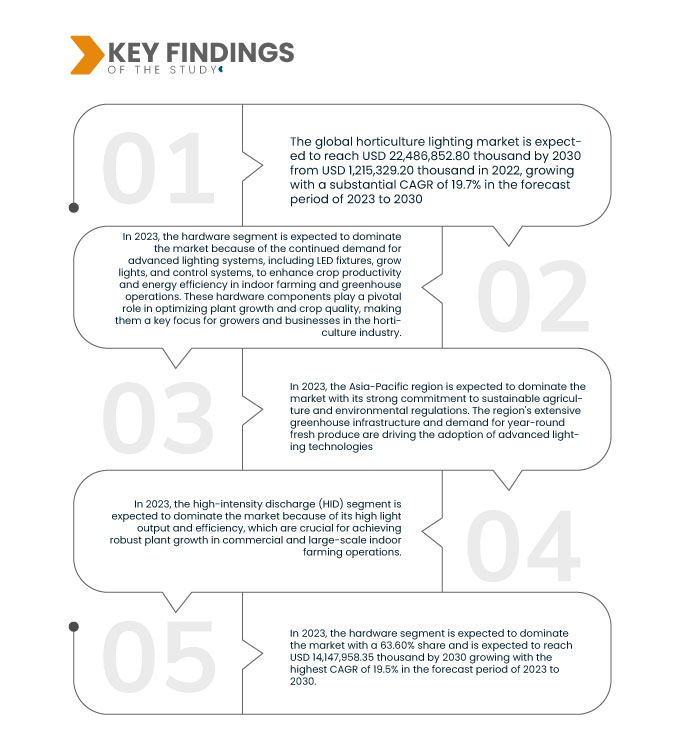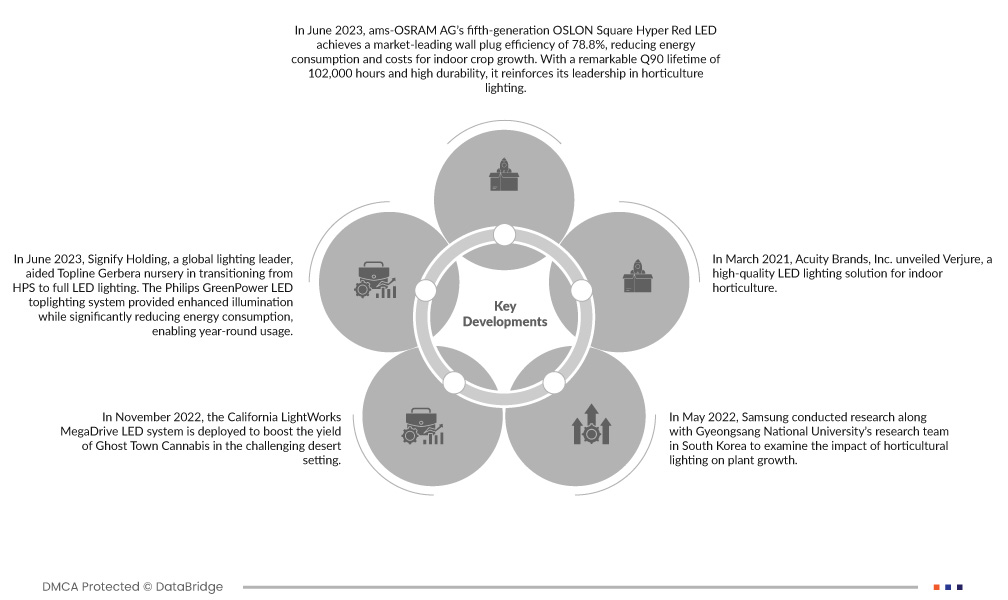Prevê-se que a população mundial cresça 2,2 mil milhões de pessoas entre 2009 e 2050 e, para alimentar uma população tão grande, os países têm de duplicar a sua produção alimentar, o que resulta num aumento da procura de uma agricultura sustentável devido à diminuição das terras agrícolas. Além disso, a crescente demanda por alimentos orgânicos, o aumento do uso de iluminação hortícola em diversas aplicações agrícolas, os avanços na tecnologia LED e a crescente demanda por alimentos orgânicos estão impulsionando o crescimento do mercado. A principal restrição que está afetando o mercado são os complexos requisitos de espectro de luz e o alto custo associado à fabricação de luz para horticultura.
Acesse o relatório completo @https://www.databridgemarketresearch.com/reports/global-horticulture-lighting-market
A Data Bridge Market Research analisa o Mercado global de iluminação para horticultura deverá atingir US$ 22.486.852,80 mil até 2030, de US$ 5.428.000,00 mil em 2022, crescendo com um CAGR substancial de 19,7% no período de previsão de 2023 a 2030.
Principais conclusões do estudo
O aumento do uso da iluminação horticultura em diversas aplicações agrícolas impulsiona o crescimento do mercado
O uso crescente de iluminação para horticultura em diversas aplicações agrícolas está de fato agindo como um impulsionador significativo para o mercado global de iluminação para horticultura. Esta tendência aumenta a consciencialização sobre os benefícios da Agricultura em Ambiente Controlado (ACE) e a necessidade de enfrentar os desafios dos métodos agrícolas tradicionais, tais como a variabilidade climática, a terra arável limitada e a necessidade de produção agrícola durante todo o ano. Os consumidores procuram cada vez mais frutas, vegetais e ervas cultivadas perto de casa, aumentando a necessidade de cultivo durante todo o ano. Uma aplicação importante que impulsiona o mercado de iluminação para horticultura é Agricultura vertical. As fazendas verticais estão ganhando popularidade nas áreas urbanas devido à sua capacidade de maximizar o espaço e, ao mesmo tempo, minimizar os impactos ambientais.
Assim, as vantagens acima para as empresas fizeram com que melhorassem o atendimento ao cliente, pois há um aumento na demanda por melhoria no atendimento ao cliente, o que impulsionará o crescimento do mercado global de iluminação para horticultura.
Escopo do relatório e segmentação de mercado
|
Métrica de relatório
|
Detalhes
|
|
Período de previsão
|
2023 a 2030
|
|
Ano base
|
2022
|
|
Anos históricos
|
2021 (personalizável para 2015-2020)
|
|
Unidades Quantitativas
|
Receita em milhares de dólares, volumes em unidades, preços em dólares
|
|
Segmentos cobertos
|
Oferta (Hardware, Software e Serviços), Implantação (Solução Turnkey e Solução de Retrofit), Tipo de Iluminação (Iluminação Superior, Iluminação Suplementar, Iluminação Interna, Iluminação Fotoperiódica e Iluminação de Fonte Única), Tipo de Iluminação (Iluminação Superior, Iluminação Suplementar, Iluminação Interna , Iluminação Fotoperiódica e Iluminação de Fonte Única), Cultivo (Verduras, Frutas e Floricultura), Tecnologia (Descarga de Alta Intensidade (HID) e Fluorescente), Aplicação (Estufa e Agricultura Vertical)
|
|
País coberto
|
EUA, Canadá, México, Alemanha, Reino Unido, França, Espanha, Itália, Holanda, Rússia, Suíça, Dinamarca, Suécia, Polónia, Bélgica, Turquia, Noruega, Finlândia, Resto da Europa, China, Japão, Coreia do Sul, Índia, Malásia , Taiwan, Austrália, Cingapura, Indonésia, Tailândia, Nova Zelândia, Filipinas, Vietnã, Resto da Ásia-Pacífico, Brasil, Argentina, Resto da América do Sul, África do Sul, Arábia Saudita, Bahrein, Emirados Árabes Unidos, Kuwait, Omã, Catar, Egito , Israel e resto do Médio Oriente e África
|
|
Participantes do mercado cobertos
|
ams-OSRAM AG (Áustria), Samsung (Coréia do Sul), ACUITY BRANDS, INC. (EUA), The Scotts Company LLC (EUA), Signify Holding (Holanda), EVERLIGHT ELECTRONICS CO., LTD. (Taiwan), TE Connectivity (Reino Unido), Cree LED, uma empresa SGH. (EUA), UPSHINE Lighting, SAVANT TECHNOLOGIES LLC (EUA), Valoya, Inc.(Finlândia), Hortilux Schréder (Holanda), excite LED Grow Lights (Suíça), Horticulture Lighting Group (EUA), Thrive Agritech (EUA), Califórnia LightWorks (EUA), Agnetix (EUA), Active Grow (EUA), Heliospectra (Suécia), Midstream Ltd. (Reino Unido), Forge Europa (Reino Unido), TESLUX Lighting sro (República Tcheca), The Ronfell Group (Reino Unido)
|
|
Pontos de dados abordados no relatório
|
Além dos insights sobre cenários de mercado, como valor de mercado, taxa de crescimento, segmentação, cobertura geográfica e grandes players, os relatórios de mercado com curadoria da Data Bridge Market Research também incluem análises especializadas aprofundadas, produção geograficamente representada pela empresa e capacidade, layouts de rede de distribuidores e parceiros, análise detalhada e atualizada de tendências de preços e análise de déficit da cadeia de suprimentos e demanda.
|
Análise do segmento:
O mercado global de iluminação para horticultura é segmentado em seis segmentos notáveis: oferta, implantação, tipo de iluminação, cultivo, tecnologia e aplicação.
- Com base na oferta, o mercado é segmentado em hardware, software e serviços.
Em 2023, espera-se que o segmento de hardware domine o mercado global de iluminação para horticultura
Em 2023, espera-se que o segmento de hardware domine com a participação de mercado de 63,60% devido à demanda contínua por sistemas de iluminação avançados, incluindo luminárias LED, luzes de cultivo e sistemas de controle, para aumentar a produtividade das culturas e a eficiência energética na agricultura interna e nas operações com efeito de estufa. . Esses componentes de hardware desempenham um papel fundamental na otimização do crescimento das plantas e da qualidade das colheitas, tornando-os um foco principal para produtores e empresas do setor de horticultura.
- Com base na implantação, o mercado é segmentado em soluções turnkey e soluções de retrofit.
Em 2023, espera-se que o segmento de soluções prontas para uso domine o mercado global de iluminação para horticultura
Em 2023, espera-se que o segmento de soluções prontas para uso cresça com uma participação de mercado de 66,69% devido às suas substanciais demandas de energia e investimentos em infraestrutura crítica
- Com base no tipo de iluminação, o mercado é segmentado em iluminação superior, iluminação suplementar, iluminação interna, iluminação fotoperiódica e iluminação de fonte única. Em 2023, espera-se que o segmento de iluminação de topo domine com uma quota de mercado de 37,72%.
- Com base no cultivo, o mercado é segmentado em hortaliças, frutas e floricultura. Em 2023, espera-se que o segmento de hortaliças domine com uma participação de mercado de 55,39%
- Com base na tecnologia, o mercado é segmentado em Descarga de Alta Intensidade (HID), fluorescente, entre outros. Em 2023, espera-se que o segmento de Descarga de Alta Intensidade (HID) domine com uma participação de mercado de 59,96%
- Com base na aplicação, o mercado é segmentado em estufa, agricultura vertical, entre outros. Em 2023, espera-se que o segmento de estufas domine com uma participação de mercado de 47,56%.
Jogadores principais
A Data Bridge Market Research analisa ams-OSRAM AG (Áustria), Samsung (Coréia do Sul), ACUITY BRANDS, INC. (EUA), The Scotts Company LLC (EUA), Signify Holding (Holanda) como os principais players do mercado na horticultura global mercado de iluminação.
Desenvolvimentos de mercado
- Em junho de 2023, o LED OSLON Square Hyper Red de quinta geração da ams-OSRAM AG alcançou uma eficiência de tomada de parede líder de mercado de 78,8%, reduzindo o consumo de energia e os custos para o crescimento de culturas internas. Com uma notável vida útil do Q90 de 102.000 horas e elevada durabilidade, reforça a sua liderança em iluminação para horticultura. Esta inovação permite que os produtores otimizem os seus sistemas de iluminação e mantenham elevados rendimentos das colheitas, ao mesmo tempo que poupam nos custos de energia.
- Em junho de 2023, a Signify Holding, líder global em iluminação, ajudou o viveiro Topline Gerbera na transição de HPS para iluminação totalmente LED. O sistema de iluminação superior LED Philips GreenPower proporcionou iluminação aprimorada e, ao mesmo tempo, reduziu significativamente o consumo de energia, permitindo o uso durante todo o ano. Reduz o consumo de eletricidade em 40%. Isto beneficia a empresa, demonstrando suas capacidades e melhorando a imagem da marca da empresa.
- Em novembro de 2022, o sistema California LightWorks MegaDrive LED é implantado para aumentar o rendimento da Ghost Town Cannabis no desafiador cenário do deserto. O sistema MegaDrive foi controlado para otimizar o espectro e a intensidade da luz, minimizando o impacto ambiental com redução do consumo de energia e da pegada de carbono. Isso beneficia a empresa ao aumentar sua base de clientes, o que aumenta a receita e a confiança do cliente.
- Em maio de 2022, a Samsung conduziu uma pesquisa junto com a equipe de pesquisa da Universidade Nacional de Gyeongsang na Coreia do Sul para examinar o impacto da iluminação hortícola no crescimento das plantas. A pesquisa descobriu que as luzes LED brancas com comprimento de onda de pico de 437 nm são eficazes para o cultivo de alface e vegetais folhosos durante todo o ano na agricultura vertical, incentivando o desenvolvimento de fontes de luz LED especializadas em horticultura para um cultivo aprimorado. Isso beneficia a Samsung no design de seus produtos, juntamente com a necessidade de agricultura vertical.
- Em março de 2021, a Acuity Brands, Inc. revelou Verjure, uma solução de iluminação LED de alta qualidade para horticultura interna. As luzes LED Verjure Pro Series, desenvolvidas com base em pesquisas em plantas, proporcionaram desempenho confiável em vários estágios de crescimento. Eles vieram em três tamanhos para flexibilidade em ambientes como armazéns, estufas e estantes verticais.
Análise Regional
Os países cobertos pelo mercado global de iluminação para horticultura são EUA, Canadá, México, Alemanha, Reino Unido, França, Espanha, Itália, Holanda, Rússia, Suíça, Dinamarca, Suécia, Polônia, Bélgica, Turquia, Noruega, Finlândia, Resto da Europa, China, Japão, Coreia do Sul, Índia, Malásia, Taiwan, Austrália, Singapura, Indonésia, Tailândia, Nova Zelândia, Filipinas, Vietname, Resto da Ásia-Pacífico, Brasil, Argentina, Resto da América do Sul, África do Sul, Arábia Saudita, Bahrein , Emirados Árabes Unidos, Kuwait, Omã, Catar, Egito, Israel e Resto do Oriente Médio e África.
De acordo com a análise da pesquisa de mercado da Data Bridge:
Ásia-Pacífico é a que mais cresce e deverá ser a região dominante no mercado
Espera-se que a Ásia-Pacífico domine o mercado com o seu forte compromisso com a agricultura sustentável e as regulamentações ambientais. A extensa infra-estrutura de estufas da região e a procura de produtos frescos durante todo o ano estão a impulsionar a adopção de tecnologias avançadas de iluminação.
Para obter informações mais detalhadas sobre o relatório global do mercado de iluminação para horticultura, clique aqui –https://www.databridgemarketresearch.com/reports/global-horticulture-lighting-market














